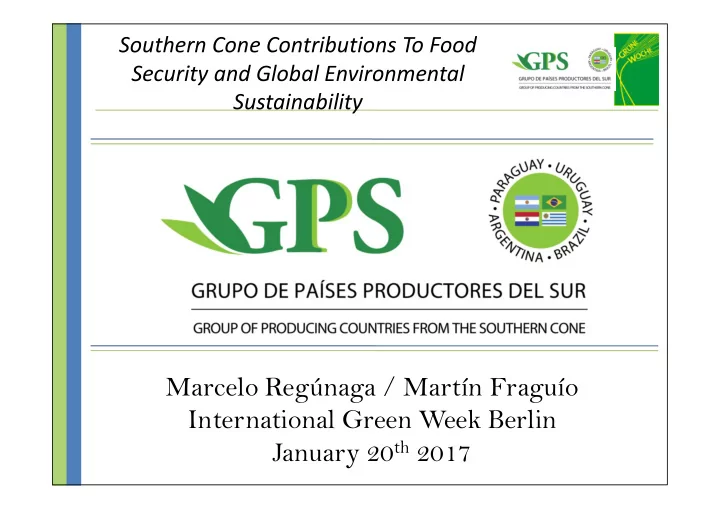

Southern Cone Contributions To Food Security and Global Environmental Sustainability Marcelo Regúnaga / Martín Fraguío International Green Week Berlin January 20 th 2017
SOUTHERN CONE CONTRIBUTIONS TO FOOD SECURITY AND GLOBAL ENVIRONMENTAL SUSTAINABILITY � The challenge of achieving food security is complex since climate change and natural resource sustainability should be considered. � The Southern Cone has a proven track record of innovations to increase food production based on sustainable production systems systems � Projections show that these countries will increase their share in net food exports during the next decade � Smooth global food trade should facilitate food security and natural resource sustainability � The Southern Cone has a valuable experience of “sustainable intensification” that could be an interesting alternative to most world production systems that are deteriorating natural resources and contributing excessively to global warming
TOTAL WORLD AND ABPU COUNTRIES PRODUCTION PROJECTIONS. SELECTED RODUCTS. 2015-2024 (annual growth rates in %) Source: FAO-OCDE Outlook; INAI
TOTAL WORLD AND ABPU COUNTRIES TRADE PROJECTIONS. SELECTED PRODUCTS . 2015-2024 (annual growth rates in %) Source: FAO-OCDE Outlook; INAI
ABPU COUNTRIES’ NET EXPORTS AND EXPORT SHARES. SELECTED PRODUCTS 2015 & 2024 (million tons and %) Net Exports World Exports Share Share Growth (million ton) (%) (%) Products* 2015 2024 2015 2024 2015-2024 A B C D ((D-C)/C) 72,5 76,2 Cereals 20,0% 18,5% -7,09% 69,2 91,8 Oilseeds 47,0% 51,8% 10,27% 141,7 168,0 Total Grain 27,7% 28,6% 2,96% 7,7 13,5 Vegetable Oils 9,9% 15,0% 50,51% 48,9 59,8 Protein Meals 57,3% 61,4% 7,24% 23,3 29,1 Sugar 40,7% 42,2% 3,73% 7,8 11,7 Meats 24,7% 31,0% 25,56% 0,3 0,7 Dairy Products 3,9% 7,5% 92,36% 1,6 1,6 Biofuels** 16,2% 15,6% -3,95% Source: FAO-OCDE Outoook; INAI. Notes * Products as specified in FAO-OCDE Outoook ; ** Thousand of million litres
SOUTHERN CONE CONTRIBUTIONS TO GLOBAL ENVIRONMENTAL SUSTAINABILITY � Sustainability of natural resources and climate change are major issues for the future of global life quality. � However, the Southern Cone has a proven track record of innovations to increase food production based on sustainable systems systems � Most food production systems are based on intensive use of energy, fertilizer and other agrochemicals. This has a negative impact on natural resources and climate change � The Southern Cone has a valuable experience of “sustainable intensification” that could be an interesting alternative to most world production systems that are not friendly with the environment
MASSIVE ADOPTION OF NO -TILL PLANTING IN ARGENTINA (percentage of total cultivated land under no-till) 100% 90% 80% 70% 60% 50% 50% 40% 30% 20% 10% 0% Source: AAPRESID and ReTAA-Bolsa de Cereales. Note: * Preliminar.
USE OF NO-TILL PLANTING IN ARGENTINA IN THE MAIN ANNUAL CROPS IN 2012/13 (% of total planted area with each crop) Source: ReTAA-Bolsa de Cereales 2015.
MASSIVE ADOPTION OF NO-TILL PLANTING IN BRAZIL 35,0 30,0 25,0 n hectares 20,0 Million hec 15,0 10,0 5,0 - Source: Markestrat, with National Federation of No-tillage in the Straw (FEBRAPDP) and CONAB data (2012).
YIELDS GREW WHILE ADOPTING CONSERVATION TECHNOLOGIES Evolution of major annual crops’ yields in ABPU countries (tons per hectare) Source: USDA
FINAL REMARKS � Addressing the challenge of food security, climate change and natural resources sustainability, all at the same time, is crucial for the future � Regional production and consumption imbalances are very relevant today, and it is expected that such situation will continue in future decades. � However, world trade is seriously limited by non-science- based trade barriers not consistent with world food security objectives � Therefore, a smooth world food trading system should be a major objective aimed at facilitating food security and natural resource sustainability � G20 Ministers of Agriculture should take the leadership in promoting a more open and rational world trading system
FINAL REMARKS (cont) � Many food production systems have negative impacts on climate change and natural resources. � On the contrary, during the last two decades the Southern Cone countries have implemented a production intensification strategy which allowed increased production and environmental friendliness. production and environmental friendliness. � The valuable experience of the Southern Cone countries could be an interesting alternative to production systems that are not friendly with the environment, instead of other alternatives such as the so called greening agriculture which do not guarantee global food security
Remarks… Questions… Thank you, Martín Fraguío / Marcelo Regúnaga
Recommend
More recommend